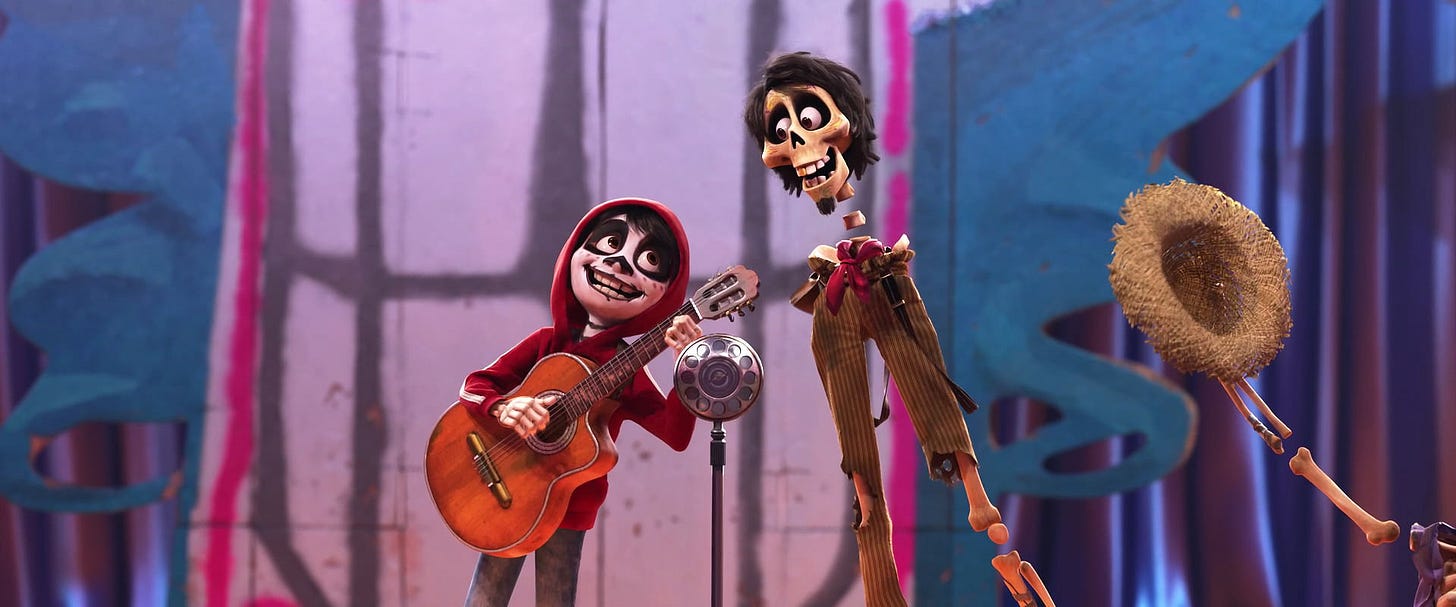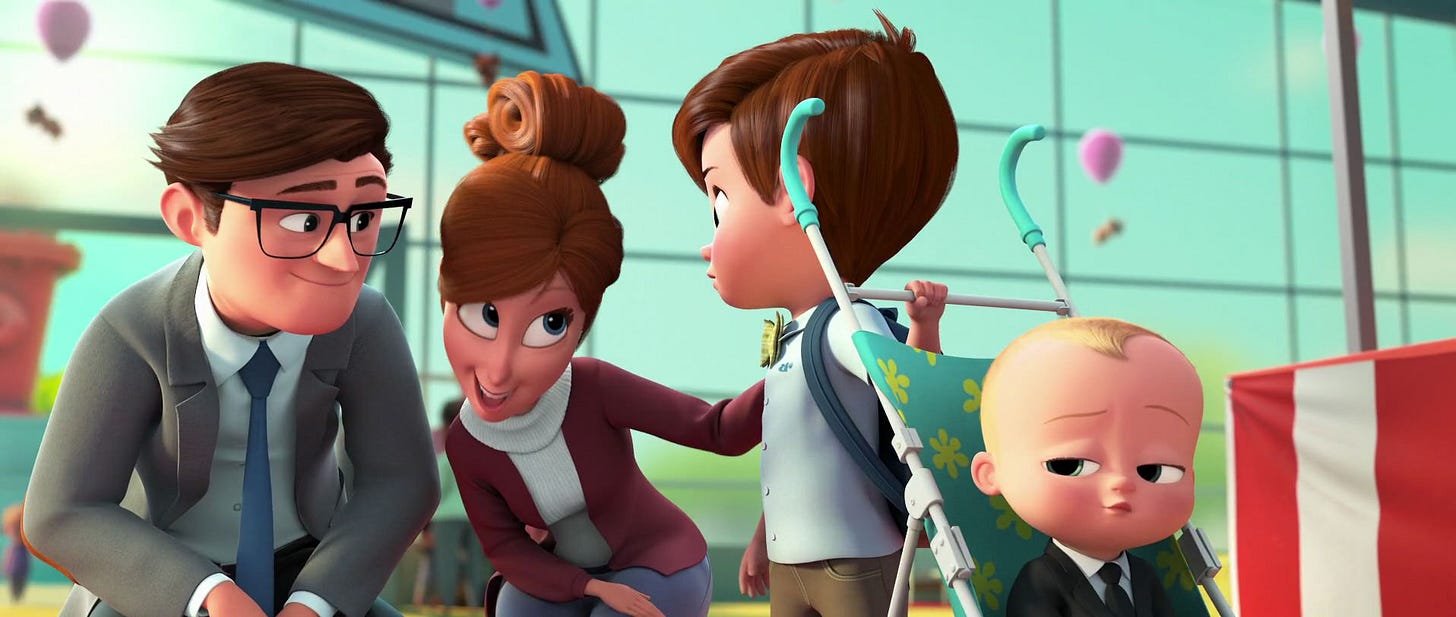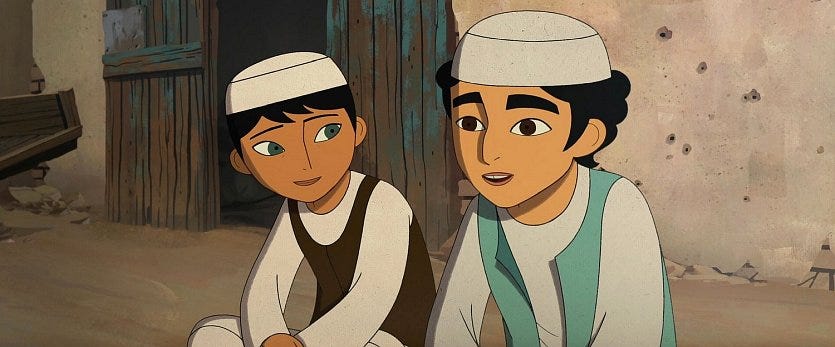Better Animated Feature: 2017
We all remembered Coco. How much of an impression did the other nominees make on us?
This post may be too long for email. We recommend clicking through to the website for the best experience.
Eli: Well, 2017 wasn’t as wretched as 2016 on the Hollywood animation front—it couldn’t possibly have been; Coco came out this year—but it was still certainly a down year.
Pixar held up their end of the bargain, releasing the amazing Coco and the massively underrated Cars 3, but outside of them…yikes. DreamWorks gave us the memetastic The Boss Baby (which actually earned a nomination) and the already forgotten Captain Underpants: The First Epic Movie (which thankfully didn’t). Illumination couldn’t have sunk lower than their 2016 output if they tried, but Despicable Me 3 did release this year to widespread bafflement and disappointment, grossing a billion dollars worldwide entirely on the strength of its brand name. Of course, The Emoji Movie came out this year; no further explanation necessary there. And I haven’t even mentioned the other nominee this year that came from a large studio in the United States. Try to name it without looking it up or scrolling down, I dare you.
Meanwhile, Legos stayed losing, as two follow-ups to The Lego Movie (2014) missed out on nominations. Perhaps in a year when the Best Animated Feature winner was less iconic, we would have given The Lego Batman movie a closer look, but beating Coco is a mighty tall order.
Can The Boss Baby, the mystery third American nominee, or either of the two foreign nominees even dream of toppling Coco? Let’s find out together.
The Nominees
Coco (won Best Animated Feature)
The Boss Baby (nominated)
The Breadwinner (nominated)
Ferdinand (nominated)
Loving Vincent (nominated)
The “Best” Animated Feature: Coco
Eli: I’ll say this up front: Coco is my favorite animated movie. I grew up as a Toy Story 2 stan and, when we did Pixar Pints, I was sure nothing else in Pixar’s filmography would come close to surpassing it. Boy, was I glad to be wrong.
In case you’re unfamiliar, Coco follows Miguel Rivera, a 12-year-old trying to pursue his musical dreams against the wishes of his grandmother, the matriarch who has banned all music in the family. He then learns he is the great-great-grandson of Ernesto de la Cruz, a world famous musician from the Riveras’ hometown, and—desperate to play after his grandmother broke his guitar in anger—breaks into de la Cruz’s memorial on the Day of the Dead to steal his guitar. This curses him to the Land of the Dead, where he has to receive his family’s blessing to return to Earth by sunrise, but his deceased ancestors share his grandmother’s disdain for music and only allow him to return if he vows never to play music again, so he rejects their blessing and sets off to find de la Cruz.
There’s so much Coco does just about perfectly, from vivid, imaginative representations of Mexican folklore to thoughtfully composed, incredibly catchy ranchero tunes. Aside from the standard John Ratzenberger cameo, they even had a 100% Hispanic voice cast (a fairly obvious move that they somehow screwed up three years later with Soul). And the storytelling, after so many recent disappointments from Pixar in this regard, is second to none. The characters are complex and intriguing, the themes are poignant, and the villain is among Pixar’s best.
As with my Pixar Pints review, I find myself hesitant to reveal much, as I truly wish everyone could experience this film the way I first did. Anything I’d say couldn’t even do it justice; it’s that good.
Obviously I would be hard-pressed to declare anything from this year better than Coco. Perhaps my friends disagree?
The Other Animated Features
The Boss Baby — Eli
Nominated
Prior to this project, I was familiar with The Boss Baby only as the meme it has become. Regarding the movie itself, I knew that Alec Baldwin voiced the titular, suit-clad baby; no more. Because this movie has mixed-to-negative reviews, I figured I was in for a DreamWorks slopfest on the level of Puss in Boots or Shrek the Third.
But…y’know, I’ll just come out and say it: The Boss Baby is good, actually. It doesn’t come close to Coco—which, again, is my favorite animated movie—but I think it’s extremely over-hated and I can absolutely see why it was nominated for Best Animated Feature.
The humor, while it can slip into the juvenile (as DreamWorks often does), amounts to a pretty sharp critique of corporate America and of destiny being determined at birth. This somewhat grounded, adult subject matter lends the movie some artistic credibility and allows for many other intellectual analyses of plot threads it’s likely DreamWorks just meant as silly kids’ movie fodder.1 In fact, a couple years ago, some philosophy PhD students held a symposium just to unpack all of the ideals this movie promotes, intentionally or not. More importantly to most viewers, there’s more than enough here to keep adults engaged.2
The aesthetic artistry on display is among DreamWorks’ best. The base 3D animation looks good on its own, but it’s bolstered by these trippy imagination sequences from the perspective of Tim, the seven-year-old protagonist, that showcase childlike curiosity better than just about any animation I’ve ever seen. Anything would have been an improvement over the dull, glitch-ridden animation of Puss in Boots, the last DreamWorks effort I watched for this project, but I can honestly say they sorta cooked here.
There have definitely been some years (2006 comes to mind) in which I would consider The Boss Baby a worthy winner of Best Animated Feature. No, I’m not joking. Fortunately for the credibility of The Low Major, 2017 is not one of those years. The Boss Baby cannot possibly stack up to Coco in concept alone, but even comparing the two movies piece-by-piece, Coco has a more heartfelt story, a more engrossing aesthetic, and significantly more cultural importance (with a ton of catchy music to boot).
I am willing to say that I enjoyed watching The Boss Baby, but for the purposes of this piece, that’s as far as I can go.
Verdict: Not a better animated feature
The Breadwinner — Leah
Nominated
The Breadwinner is a film with a lot of heart, and a heaping dose of brutal reality. Set in 2001 Kabul (students of history may already see where this is going), The Breadwinner follows protagonist Parvana, an eleven-year-old girl who lives with her father, mother, older sister, and younger brother. Her father is taken away to prison by the Taliban, putting her family in a precarious position, since women are not allowed to be outside without a male relative. Out of desperation, Parvana cuts her hair and disguises herself as a boy, so she can go out and get food and money for her family, as well as trying to find a way to reunite with her father.
For some historical context, 2001 is the year the US started invading Afghanistan, so the film has an undercurrent of war developing, like showing US fighter jets flying in the sky above. This movie isn’t sugarcoating what it’s like to live under an oppressive regime, or in a country under the threat of war. Parvana’s story highlights the turmoil of the era, and how regular people’s lives were affected by the rule of the Taliban and the invasion of Afghanistan, and how hope can thrive even under the direst of circumstances.
The visuals in this film are excellent. There’s a haunting quality to the desolate road Parvana walks down to get to the prison where her father is being kept, or when she and her friend Shauzia (another girl dressing as a boy) are talking in a field of abandoned tanks. For me, the highlight of the movie’s visuals was the art style used while Parvana was telling a story to her little brother. The story is woven in parts throughout the narrative of the film. The fantastical, folkloric style offers a good contrast to the movie’s main style, and provides a fitting medium to tell the story within a story.
Compared to Coco, it’s pretty clear the two films have different things to offer. The Breadwinner’s narrative is informed by political conflict and historical events, shining a light on societal failings and how it harms individuals, while Coco’s narrative doesn’t touch upon societal causes for individual suffering in the same way, instead focusing on specifically familial and interpersonal conflict as the cause of strife throughout the movie. Both ways of driving a narrative have their place, but it results in a radically different film viewing experience.
Eli already said a lot in praise of Coco, but I’ll just add that it is genuinely an amazing film. The visuals in the Land of the Dead are stunning and intricate. I do think the visuals in The Breadwinner are good, but they aren’t on the same level of technical achievement as Coco. Coco also has one of the most immersive stories I’ve ever experienced in a movie (definitely the most immersive Pixar film for me). The Breadwinner had a good narrative, and I was invested in the characters, but the detail of Coco’s worldbuilding and character development takes it to a completely different level.
Honestly, The Breadwinner is a really good film, but Coco is arguably one of the best animated films of all time. I feel bad not coming up with a stronger case for it since I do think it was a deserving nominee. If it had come out a different year, my verdict would probably be different, but in 2017 there’s no getting around Coco’s mastery of the artform. Don’t sleep on The Breadwinner, though; still a worthy contender and a good film that explores life in 2001 Afghanistan.
Verdict: Not a better animated feature
Ferdinand — Eli
Nominated
The last time we checked in on Blue Sky Studios was a dozen years ago in 2005, when Preston eviscerated Robots, which wasn’t even nominated that year. To find Blue Sky’s last nomination, you gotta go all the way back to their first feature film Ice Age, released in 2002.
Since then, they’ve given us three more Ice Age films, two Rio films (remember Rio?), a Dr. Seuss movie, a Peanuts movie, and something called Epic. Despite these films all being box office successes, from a quality standpoint, it always seemed clear that Blue Sky was on the B-list.
Enter Ferdinand. Based on the 1936 children’s book The Story of Ferdinand, the movie follows the titular bull: a pacifist who wants to live a peaceful life rather than succumbing to the violent, bullfighting fate everyone tells him he’s destined for.
I’ll just be straight with you: I can’t even pretend to give this movie a fair comparison to Coco. A lot of that isn’t Ferdinand’s fault given how much I love Coco, but you just read me showering genuine praise on The Boss Baby, so you should understand that I’m at least willing to give other movies a shot if they deserve it. Ferdinand just doesn’t.
The movie’s extremely trite message of “be yourself” is told in an extraordinarily predictable manner from start to finish, and yet the two most important story beats also bafflingly remove all agency from Ferdinand. In the beginning, he gets captured and sent to the bull ranch because he inadvertently acts wildly out of character after getting stung by a bee, and in the end, he wins the big bullfight because the matador’s muleta gets stuck to his horns and he kicks the matador’s ass by mistake as he’s trying to remove it. What message are we supposed to take from either of these moments? A better movie might actually have something to say about its obvious allegory for real-world toxic masculinity, but this one spouts unearned, meaningless platitudes.
So much of this movie gave me Illumination vibes, which is never a good thing coming out of my mouth. The voice cast contains the most chaotic list of random celebrities you could possibly imagine; it’s led by John Cena and supported by Peyton Manning (in his only animated movie appearance ever), Kate McKinnon, Gabriel Iglesias, David Tennant, Daveed Diggs, and a whole host of others. The animation is sometimes noticeably grainy for no good reason. The soundtrack includes seven songs and two of them are from Pitbull because he speaks Spanish in them. The movie is set in Spain. Pitbull is Latin American. These two are not the same place! One colonized the other! I criticized Puss in Boots for this same thing six years ago; stop doing this!
Ugh. I know I’m rambling now, probably to the point of incoherence, but this movie simultaneously bored and annoyed me like very little other media I’ve ever consumed. I don’t wanna talk about it anymore. Audiences didn’t really want to either, apparently. Ferdinand bombed domestically and only turned a profit thanks to the international market.
This is the last we’ll see of Blue Sky Studios. In 2019, they were acquired by Disney and then released Spies in Disguise, another unremarkable movie that bombed both domestically and internationally. The studio was closed in 2021.
Verdict: Not a better animated feature
Loving Vincent — Preston
Nominated
Loving Vincent is an extraordinary rarity in the world of film: a production using an almost entirely unique visual technique. As an homage to, and a story about, the iconic painter Vincent van Gogh, the entire movie consists of real oil paintings on canvas, created by artists rather than traditional animators. For the most part, it’s a gorgeous effect, and one that fits perfectly given the story’s subject matter. In an age when countless stories that really should be animated are forced into live action for the sake of A-list actors, it’s nice that a story about an artist was presented in such an appropriate style.
For understandable reasons, the animation of Loving Vincent is pretty much all anybody talks about with this film, but it’s more than just an art piece. There’s a narrative to it, too, and a fairly interesting one; the story focuses on a fictionalized version of Armand Roulin, a subject who sat for van Gogh when he was alive, traveling to the site of the painter’s death and investigating the unusual circumstances surrounding it. As far as the often-unenviable task of presenting dry historical information in film goes, it’s not a bad way of doing it; the facts about van Gogh’s fate unfold in a way that feels natural and engaging enough, albeit a bit slow, and Armand himself makes for an intriguing main character in the process. Loving Vincent has a question to ask that’s more interesting than most historical semi-documentaries: why love Vincent? It’s not merely an exploration of his capabilities as an artist, but also of his humanity, the aspects of his personality that drew some to him and pushed many others away. And it’s an exploration of what art is, one that goes beyond the trite idea that it’s a valuable thing by its very nature and explores just what makes it worth pursuing.
There are years where I would pick this as the Best Animated Feature. That’s something that could be said of almost any film I haven’t picked, of course, but I think it’s a somewhat notable accomplishment here, because Loving Vincent could’ve very easily been a rather empty movie with some visual fireworks and not much else. It was originally conceived as a short film, nearly a decade before its full release, and you can imagine how much more of a focus could’ve been placed on the animation style alone without a conscious effort to develop it into a worthwhile feature-length film all around.
But while it’s on the high end of what it could have been, Loving Vincent isn’t perfect. The pacing drags quite a bit, and it’s probably fair to say that the film really doesn’t know where to end; it’s hard to when the central narrative question—how did Vincent die?—goes unanswered, and the most resolution we get is the decision that it doesn’t really matter. It’s still a very strong movie, and one well worth seeing if anything it touches on interests you, but it’s up against possibly the best film Pixar has put out since the beginning of the 2010s. That’s a hard matchup for any BAF contender to win, and this one doesn’t quite get there in the end.
Verdict: Not a better animated feature
Running Tally
2001: 2 better (2 nominated; 3 snubbed)
2002: 1 better (4 nominated; 0 snubbed)
2003: 1 better (2 nominated; 2 snubbed)
2004: 0 better (2 nominated; 1 snubbed)
2005: 2 better (2 nominated; 2 snubbed)
2006: 3 better (2 nominated; 2 snubbed)
2007: 3 better (2 nominated; 1 snubbed)
2008: 0 better (2 nominated; 0 snubbed)
2009: 2 better (4 nominated; 2 snubbed)
2010: 3 better (2 nominated; 4 snubbed)
2011: 1 better (4 nominated; 0 snubbed)
2012: 4 better (4 nominated; 1 snubbed)
2013: 2 better (4 nominated; 0 snubbed)
2014: 3 better (4 nominated; 1 snubbed)
2015: 2 better (4 nominated; 0 snubbed)
2016: 5 better (4 nominated; 1 snubbed)
2017: 0 better (4 nominated; 0 snubbed)
TOTAL: 34 better (52 nominated; 20 snubbed)
Coco joins The Incredibles (2004) and WALL-E (2008) as movies we unambiguously agree deserved the win. There’s just something about peak Pixar…
…too bad we gotta look at maybe their worst sequel ever next time. Join us in two weeks when we compare winner Spider-Man: Into the Spider-Verse to the reprehensible Incredibles 2 and three other contenders.
Next: 2018 (4 nominated; 0 snubbed)
For example, the primary conflict between puppies and babies has led some to conclude that the movie is trying to tell us that dog ownership is a cause of lower birth rates. There’s no way director Tom McGrath meant that. Puppies are cute and babies are cute; there’s your kids’ movie conflict.
There’s a Glengarry Glen Ross homage. There’s no way any children watching The Boss Baby (25 years after Glengarry Glen Ross released) knew what was going on.













Wow, no Better Animated Features this year :O Not really a surprise when you consider who won though